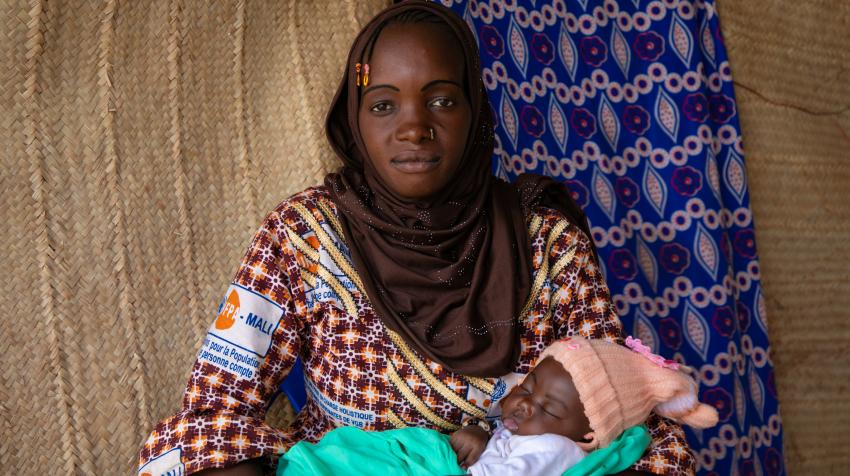April 2015, No. 4 Vol. LII, Implementing the 2030 Agenda: The Challenge of Conflict
The 2030 Agenda for Sustainable Development, adopted by the United Nations General Assembly on 25 September 2015, recognizes not only that peace and security are prerequisites for achieving sustainable development, but that sustainable development provides the pathway to peaceful societies.
This new peace-centred agenda is inclusive and ambitious and could usher in a new spirit of global solidarity. With its five pillars of peace, people, planet, prosperity and partnerships, it opens a new era of development. Translating its 17 goals and 169 targets into concrete action on the ground will only be possible with the support and engagement of all major stakeholders, including Governments, civil society, business, academia, parliaments, and international organizations. As the world's largest regional security organization under Chapter VIII of the Charter of the United Nations, the Organization for Security and Co-operation in Europe (OSCE) is ready to do its part to contribute to this critical global effort.
The OSCE comprehensive concept of security, which embraces politico-military aspects, the economy and the environment, as well as human rights and democracy, is fully compatible with the 2030 Agenda. Indeed, already in 1975, the organization's founding document, the Helsinki Final Act, recognized key economic, social and environmental issues that are fundamental to sustainable development as we understand it today. In the decades since then, the OSCE participating States reached consensus on a number of other relevant political commitments, including the 2003 Maastricht Strategy Document for the Economic and Environmental Dimension which puts a strong focus on sustainable development and defines specific actions and areas for cooperation. These are among the key building blocks of the OSCE efforts to support the 2030 Agenda for Sustainable Development.
PEACE
The 2030 Agenda's focus on "peace, is not a coincidence and comes at a critical time for global and regional security. In the OSCE region, armed conflict is once again a reality and divisions are growing, undermining the very foundations of both regional and international security. A range of new transnational and global threats, that are also addressed in the 2030 Agenda, further aggravate these security challenges.
The OSCE is first and foremost a security organization. Its comprehensive security concept and its broad membership of 57 participating States provide a solid basis for promoting sustainable development. Since the 2030 Agenda reinforces the close relationship between peace, security and development, the foremost contribution of the OSCE to its implementation is likely to be through its engagement in all stages of the conflict cycle, from early warning and conflict prevention, through crisis management, conflict resolution and post-conflict rehabilitation. Through its network of field operations in more than a dozen countries and the activities of its secretariat, institutions and Parliamentary Assembly, the OSCE is actively involved in fostering security at multiple levels. Its field operations stand out in particular. Not only do they provide longterm support for reform efforts, but also help keep the finger on the pulse in specific settings by offering early warning and support for possible early action in the emergence of a crisis, monitoring implementation of conflict resolution measures, or assisting countries with post-conflict rehabilitation and the reconciliation efforts. At the same time, OSCE support for confidence- and security-building measures through arms control, military transparency and dialogue is equally important for stability and sustainable development.
PEOPLE
Ensuring lasting peace, prosperity and stability for more than a billion people in North America, Europe and Asia is a major OSCE objective. The organization's support for strengthening democratic institutions, promoting the rule of law and protecting human rights helps to nurture sustainable development. These efforts are reinforced by the active involvement of members of the OSCE Parliamentary Assembly who, as parliamentarians, feature among the major stakeholders defined by the 2030 Agenda. The OSCE has also developed specific tools and programmes tailored to help governments address the root causes of intolerance and discrimination and will continue to promote inclusive societies, tolerance for diversity and integration. Recognizing the crucial importance of the free flow of information in maintaining peace, advancing democracy and ensuring sustainable development, the OSCE will continue its support for free and pluralistic media in all of its participating States.
Achieving gender equality and empowering women form a cornerstone of the OSCE security approach, which protects and promotes the human rights and dignity of women and men and advocates for women's full and equal participation in society both in peacetime and in times of conflict. OSCE activities to empower women and girls, to ensure their full and effective participation in political, economic and public life and to eliminate all forms of violence against them are fully compliant with the 2030 Agenda.
The global migration challenge can be met only by developing cooperative, rights-based approaches to ensure that migration can continue to act as a powerful catalyst for development. Efficient migration policy frameworks, including at the regional level, are a key ingredient for facilitating safe and responsible migration and mobility of people. The OSCE will continue to offer an inclusive platform for dialogue and provide expertise for facilitating integration of migrants and refugees, effective management of labour migration, and enhancing freedom of movement, which can benefit sustainable development.
PLANET
The OSCE recognizes the two-way relationship between the environment and security-environmental challenges as a potential source of conflict, and environmental cooperation as a tool for conflict prevention and confidence-building. It will continue to contribute to international discussions on environmental issues from a security perspective and aim at transforming environmental risks into opportunities for cooperation, with a focus on the following thematic areas:
- Water is a cross-cutting issue for sustainable development and also an indispensable aspect of the OSCE comprehensive approach to security. The organization supports its participating States in jointly managing water resources and promotes good water governance through projects on the regional, national and local levels. It will continue to make full use of the potential offered by water diplomacy to increase security and stability in its region.
- Natural and man-made disasters represent another difficult challenge to both security and sustainable development. The OSCE will continue its support for disaster risk reduction mainly through awareness-raising and capacity strengthening within and across borders. The Sendai Framework for Disaster Risk Reduction 2015-2030 will be an important reference in this endeavour.
- The 2030 Agenda calls for urgent action to combat climate change. In the course of discussions at an October 2015 OSCE Security Days event dedicated to climate change and security it was concluded that the compound risks posed by climate change require a multidimensional response. According to some experts, climate change is no longer a mere "threat multiplier" for security, but a "threat catalyst". However, cooperation in addressing climate change and climate diplomacy is also a good entry point for preventing conflict situations and strengthening trust. Building on the global political momentum generated by the 2015 Paris Agreement on climate change, the OSCE will continue to analyse and raise awareness of the security implications of climate change, identify geographical hotspots, and assist its participating States in developing and implementing adaptation strategies, particularly in transboundary contexts.
- Environmentally sound management of hazardous waste and toxic chemicals and prevention of their illegal transportation across borders are also areas where the OSCE offers extensive experience in assisting its participating States. This expertise, along with initiatives for increasing resource efficiency, can contribute to ensuring sustainable consumption and production patterns.
- The OSCE also promotes environmental good governance. The OSCE-supported network of Aarhus Centres, which now includes 60 Centres in 14 of the organization's participating States, contributes to peace, democracy and sustainable development by promoting and enhancing access to information, public participation and access to justice, as well as transparency and accountability.
- The OSCE offers a platform for energy security dialogue, cooperation, exchange of information and sharing of best practices on sustainable and renewable energy and energy efficiency. By bringing together major energy producing, transit and consuming countries, it will continue to play a significant role in the development of a sustainable approach towards energy security.
PROSPERITY
Good economic governance, the rule of law and equitable economic development are the prerequisites for peaceful and prosperous communities and nations. The OSCE activities in promoting international economic cooperation, enhancing the climate for business and investment, streamlining regulatory frameworks and countering corruption, money laundering and terrorism financing will contribute to implementing the 2030 Agenda.
International trade and transport also play a vital role in regional economic development. Procedural impediments and “red tape” at border crossings all too often hamper international trade and foreign investment, creating high costs for trade transactions and delays in the crossborder movement of goods. The organization will continue to assist its participating States in developing more efficient border, transport and customs policies, while at the same time maintaining high security standards.
PARTNERSHIPS
The inclusive dialogue and cooperation of the OSCE extend beyond the borders of its 57 participating States. Close relations with 11 partner countries in the Southern Mediterranean and Asia allow the OSCE to share best practices on many issues affecting the security of both the OSCE area and neighbouring regions.
The OSCE is joining efforts first and foremost with the United Nations, but also with many other international and regional organizations to develop and implement effective responses to traditional and emerging challenges. The Environment and Security Initiative is a concrete example of this approach. This long-standing partnership between the OSCE and the United Nations Development Programme, the United Nations Environment Programme, the United Nations Economic Commission for Europe, and the Regional Environmental Centre for Central and Eastern Europe enables coordinated environmental action in support of the 2030 Agenda. While there are many other examples of OSCE partnerships in different spheres of sustainable development, there is still great potential to enhance collaboration with international financial institutions, the private sector and civil society to forge the strong coalition needed to implement the visionary but challenging 2030 Agenda for Sustainable Development.
COOPERATION IS KEY
As transnational and global challenges become increasingly complex and intertwined, they pose a growing threat to sustainable development that no single country can tackle alone. This is a key reason why regional organizations such as the OSCE have an important role to play in supporting the 2030 Agenda. The OSCE will continue to serve as an inclusive platform for dialogue and cooperation on security issues with a direct impact on development, providing a strong link between security in the OSCE region and global security. Yet closer coordination between international and regional organizations, governments and civil society, and all other relevant stakeholders is also needed to create new synergies, while ensuring an effective division of labour and efficient use of resources. Only by working together will we succeed in bringing peace and prosperity to people in every corner of our planet.
The UN Chronicle is not an official record. It is privileged to host senior United Nations officials as well as distinguished contributors from outside the United Nations system whose views are not necessarily those of the United Nations. Similarly, the boundaries and names shown, and the designations used, in maps or articles do not necessarily imply endorsement or acceptance by the United Nations.




